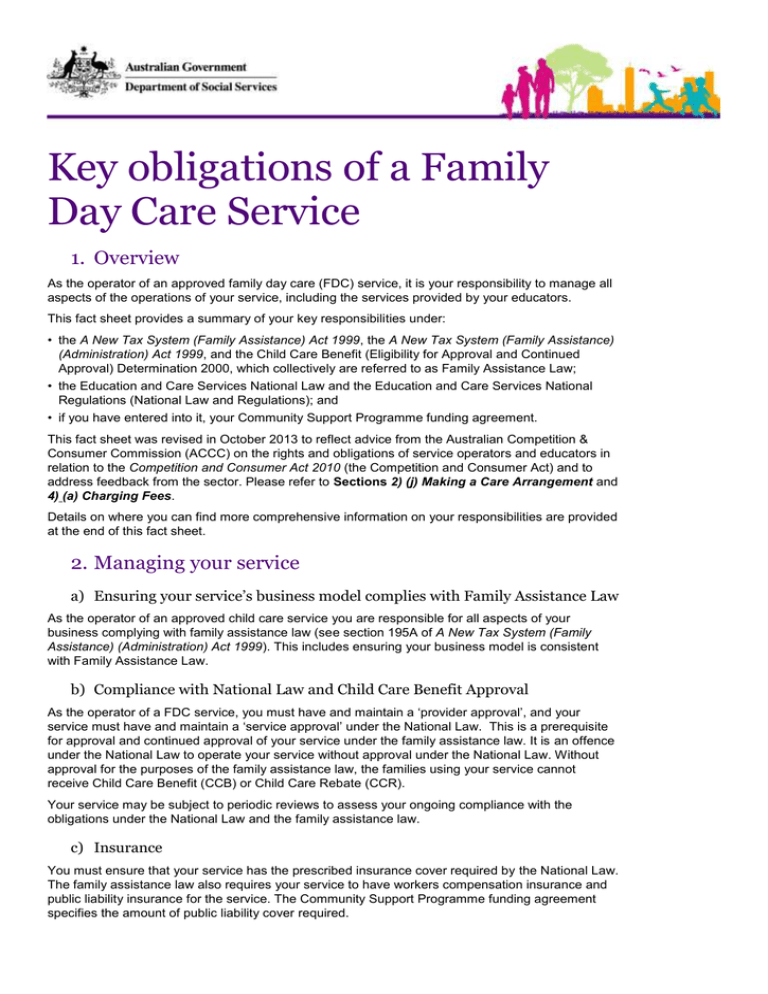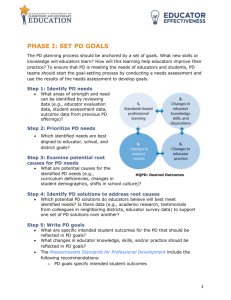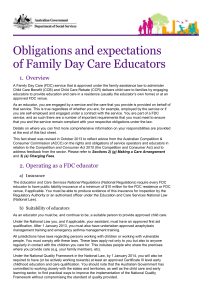DOCX file of Key obligations of a Family Day Care service
advertisement

Key obligations of a Family Day Care Service 1. Overview As the operator of an approved family day care (FDC) service, it is your responsibility to manage all aspects of the operations of your service, including the services provided by your educators. This fact sheet provides a summary of your key responsibilities under: • the A New Tax System (Family Assistance) Act 1999, the A New Tax System (Family Assistance) (Administration) Act 1999, and the Child Care Benefit (Eligibility for Approval and Continued Approval) Determination 2000, which collectively are referred to as Family Assistance Law; • the Education and Care Services National Law and the Education and Care Services National Regulations (National Law and Regulations); and • if you have entered into it, your Community Support Programme funding agreement. This fact sheet was revised in October 2013 to reflect advice from the Australian Competition & Consumer Commission (ACCC) on the rights and obligations of service operators and educators in relation to the Competition and Consumer Act 2010 (the Competition and Consumer Act) and to address feedback from the sector. Please refer to Sections 2) (j) Making a Care Arrangement and 4) (a) Charging Fees. Details on where you can find more comprehensive information on your responsibilities are provided at the end of this fact sheet. 2. Managing your service a) Ensuring your service’s business model complies with Family Assistance Law As the operator of an approved child care service you are responsible for all aspects of your business complying with family assistance law (see section 195A of A New Tax System (Family Assistance) (Administration) Act 1999). This includes ensuring your business model is consistent with Family Assistance Law. b) Compliance with National Law and Child Care Benefit Approval As the operator of a FDC service, you must have and maintain a ‘provider approval’, and your service must have and maintain a ‘service approval’ under the National Law. This is a prerequisite for approval and continued approval of your service under the family assistance law. It is an offence under the National Law to operate your service without approval under the National Law. Without approval for the purposes of the family assistance law, the families using your service cannot receive Child Care Benefit (CCB) or Child Care Rebate (CCR). Your service may be subject to periodic reviews to assess your ongoing compliance with the obligations under the National Law and the family assistance law. c) Insurance You must ensure that your service has the prescribed insurance cover required by the National Law. The family assistance law also requires your service to have workers compensation insurance and public liability insurance for the service. The Community Support Programme funding agreement specifies the amount of public liability cover required. Key obligations of a Family Day Care Service If asked, you must be able to provide documentary evidence to show that you have all the necessary insurance coverage for your service and that the insurance policies are current. Your educators must also be able to produce evidence of the public liability insurance required under the National Law. It is your responsibility to ensure all of your educators have the appropriate insurance coverage and to ensure that uninsured educators are not able to provide care on behalf of your service. d) Suitability of Individuals The operator and key personnel of your service must be, and continue to be, suitable people to operate a child care service. ‘Suitability’ refers to a range of factors: • expertise and experience in providing child care • ability to provide quality child care • governance arrangements • records of compliance with the family assistance law, quality standards and other laws • records of financial management • convictions or findings of guilt for an offence or any relevant criminal charges pending before court and • any other matter relevant to the suitability. You must also ensure that your staff, and any educators who are engaged as contractors of your service, are, and continue to be, suitable people to provide child care. Under the National Law, you must ensure that each educator and educator assistant have a number of additional qualifications, including approved first aid qualifications and, after 1 January 2013, approved anaphylaxis management training and emergency asthma management training. All jurisdictions have laws regarding persons working with children or working with vulnerable people. Your service must comply with these laws. The National Law and National Regulations have a range of particular obligations regarding this, which your service must comply with. These laws apply not only to educators but also to anyone regularly in contact with children your educators are caring for. The National Regulations state that FDC services are required to meet the following minimum qualification requirements by 1 January 2014: • all coordinators will need to have an approved diploma-level early childhood education and care qualification or above, and • all educators will be required to have (or be actively working towards) at least an approved Certificate III level early childhood education and care qualification. You should note that the Australian Government has committed to working closely with the states and territories, as well as the child care and early learning sector, to find practical ways to improve the implementation of the National Quality Framework without compromising the standard of quality provided. This includes supporting a review of current child care and early learning qualification requirements in the National Quality Framework. The sector will be kept informed as these discussions progress. Before employing or sub-contracting an educator, your service should inquire whether the educator has been subject to any recent sanctions, including termination from another service, to assist you to determine whether the educator would be considered a ‘suitable person’. e) Employment Arrangements You may choose whether staff at your service are hired as employees, or engaged as contractors, or a combination of both. Regardless of the employment arrangements, you must ensure that all staff of your service are suitable people to provide child care and are aware of, and comply with, all relevant legislative obligations. 2 Key obligations of a Family Day Care Service Educator terms and conditions, including their remuneration arrangements, should be clearly defined in a written agreement between the service operator and the educator. The nature of the written agreement will vary subject to whether the educator is an employee or an independent contractor. Service operators must be aware that educator remuneration is agreed between service operators and the educator, not between the educator and families. Service operators should not discuss setting the remuneration arrangements for their educators with other service operators as this may raise concerns under the competition provisions of the Competition and Consumer Act. Service operators should seek their own legal advice on setting educators terms and conditions and must ensure such arrangements take account of their Family Assistance Law requirements, including their business model obligations. Important advice in relation to the rights of service operators to set a service-wide fee schedule for families using their service and to determine the remuneration of educators is contained later in this Fact Sheet. f) Suitability of Care Environment Under the National Law, you are required to conduct an assessment (including a risk assessment) of each residence and approved FDC venue of your service before education and care is provided to children in each residence or venue. You must also conduct another assessment at least once a year to ensure the health and wellbeing of children being educated and cared for by your services is protected. You must be able to provide documentary evidence of these assessments having being conducted, if asked as part of a compliance visit. You should undertake regular contact visits with all educators - many services undertake fortnightly visits. These visits can be unannounced or pre-arranged. Visits provide an opportunity for service co-ordinators and field workers to assist educators with their professional development and to ensure the quality of the service is at an appropriate level. Under the National Law, your service must ensure that there are sufficient persons appointed as co-ordinators to monitor and support the educators engaged or registered by your service. Under the family assistance law you are required to notify the Department of Social Services when certain events occur, including for example where the details provided on your service’s application for approval form change. This includes when an educator: • commences with your service • ceases providing care with your service, and/or • changes their name, address or phone number. g) Quality of Care Your educators are part of your service and you are responsible for the quality of care they provide. You are required to ensure that education, support and training are available to your educators. You are also responsible for the provision of advice, support and information for parents accessing your service. The monitoring of your educator’s activities includes conducting visits to the premises where the care is being provided. This monitoring is essential to ensure that your educators are, and remain, compliant for your continued CCB approval under family assistance law. The Community Support Programme funding you may receive from the Department of Social Services is a contribution towards your operational expenses in monitoring and providing support to your network of educators. Your service should be familiar with the Early Years Learning Framework and Framework for School Age Care, as these are essential resources for implementing the National Quality Standards. The monitoring activities you must undertake are governed by your Community Support Programme funding guidelines, the National Law and the National Regulations. 3 Key obligations of a Family Day Care Service h) Quality Improvement Plans Under the National Law, you must develop and submit a Quality Improvement Plan (QIP) within three months of becoming an Approved Provider. This QIP must: • include an assessment of the quality of the practices of the service against the National Quality Standards and the Regulations • identify any areas that you consider may require improvement, and • contain a statement of the philosophy of your service. The QIP must be kept at the principal office of your service and made available: • for inspection by the Regulatory Authority or an authorised officer, and • on request, to parents of a child who is enrolled at your service, or who are seeking to enrol a child at your service. You must review and revise the QIP for your service, having regard to the National Quality Standards at least annually, and at any time when directed by the Regulatory Authority. i) Number of children in care The National Law limits the number of children an educator may care for at any one time. Generally speaking, educators may not provide approved care for more than seven children at a time. The educator’s own children and other children in the premises count towards the limit of seven if they are under the age of 13 and there is no other adult caring for these children. Educators must also provide care to no more than four children at a time who are preschool age or under. Part of the Australian Government’s commitment to work closely with the states and territories and the sector to find practical ways to improve the implementation of the National Quality Framework will include reviewing the implementation of staff to child ratios to assess whether their implementation should be slowed to give the sector enough time to absorb the changes and ensure continuity of service. Once again, the sector will be kept informed as these discussions progress. When on an excursion, educators must meet the requirements in the National Law about the number of children they are allowed to care for. Educators must also consider if they will need extra people to provide adequate supervision at all times. A risk assessment should be completed before an excursion. A template excursion risk management plan is available on the Australian Children’s Education and Care Quality Authority website. j) Making a care arrangement with a family Family Assistance Law requires the service to make a care arrangement with each family using the service. Educators do not have any legal right to independently enter into a care arrangement for CCB approved care. However, service operators may authorise educators (acting as an agent for their service) to enter into care arrangements on their behalf. In order to be eligible for Australian Government fee assistance (e.g. CCB and CCR), the care arrangement and all associated invoices and receipts must make clear that the care is being provided by the service and that the fees are being paid to the service. You must abide by the Priority of Access Guidelines when filling vacant places within your service. k) Privacy Information you or your educators collect through the delivery of education and care may be considered protected information under the family assistance law and/or personal information under the Commonwealth’s Privacy Act 1988. In handling such information, you are required to comply with the relevant obligations of these laws. 4 Key obligations of a Family Day Care Service As an example, information you collect about a child attending your service, for instance the child’s name or Customer Reference Number (CRN) should not be disclosed to others except where required under the law. Please note that the family assistance law has penalties for the unauthorised use or disclosure of protected personal information. 3. Reporting and Notification to CCMS Reporting correctly to the Child Care Management System (CCMS) is one of the key obligations of approved child care services. These reports determine how much CCB, CCR or Jobs, Education and Training Child Care Fee Assistance (JETCCFA) is paid by the Australian Government for eligible families, so the accuracy of these reports is essential. a) Enrolments You must notify the enrolment of a child for care at your service within seven days of the child starting care and you must do this through the CCMS. You must also update enrolment information given through the CCMS, including for instance where the information in the enrolment notice becomes incorrect. You may also be required to provide further information about enrolled children to the Department of Social Services on request. b) Attendances You must check the accuracy of attendance records received from your educators before you submit data to the CCMS via your software product. These reports must be submitted for all the children enrolled at your service within 14 days of the end of the week in which care was provided. It is important to remember that you are ultimately responsible for the accuracy of the data submitted to the CCMS, with the consequences for incorrect or false reporting resting with you. If you suspect that an attendance record is not accurate, in any way, then you should investigate further or confirm with the family about their attendance, the actual fee that they are liable to pay and the care arrangements they have agreed to with the educator, before submitting an attendance report to the CCMS. c) Absences CCB is not payable before a child has physically attended care or after a child has physically ceased care at your service. This means that you cannot report an absence for a child before they start attending care at your service or after a child has physically ceased care at your service. You must: • report the details of child care usage for all the children enrolled at your service within 14 days of the end of the week in which care was provided • report any sessions where a child was absent, including the type of absence (i.e. initial or additional), and • cancel all the absences after their last day of attendance. This includes where you have reported absences for a child because you are expecting them to return to care but they do not come back • make sure the parent provides supporting documentation for all additional absences and keep this for your records. Your service should, as one of its policies, place a reasonable limit on the period of time that you will consider and report to the CCMS that a child is absent and will return to care before you end their enrolment and cancel and correct any previously submitted attendance records. If the child does not return to care, any CCB paid for this period should be returned to the Department of Social Services. 5 Key obligations of a Family Day Care Service d) Providing care for the full session Where your service charges an individual a fee for providing a session of care, your service must be able to provide care for that whole session. For example, you must not report sessions of 8 hours per day, unless your service is actually able to provide care for the full 8 hours. A child may not actually attend for the full 8 hours, but you must be able to provide care for the whole period if a family require it. If your service cannot provide care for the full session, for example when an educator is not available for the full session, you must reduce the length of the sessions you report to reflect the period in which care was able to be provided. 4. Payments types, charging fees and providing statements a) Charging fees Under Family Assistance Law, parents must be charged fees by the CCB approved service and not by the educator in order to be eligible for Australian Government fee assistance (e.g. CCB and CCR). Therefore, as the service operator, you are responsible for setting your service’s fee charging schedule and establishing your service’s fee charging policies. The service operator is legally entitled to require the service’s educators to comply with the service’s fee charging schedule and policies, irrespective of whether they are employees or independent contractors. Furthermore, it is the service operator’s responsibility to do so. Service operators are required to notify the Department of Social Services of your fee rates and when your fees change. The CCMS allows you to report your fees through your CCMS software – this can be reported as a minimum and maximum range. In order for CCB to be payable, there must be a direct commercial relationship between the family that is paying for the care, and your service. Importantly, it is not your educator that is charging the family for the care, it is your service that is charging the fee. The fee your service charges a family must be a real fee – that is, it must be the fee that the family is actually liable to pay. You must not report a fee to the CCMS unless the family is liable to pay that fee under the commercial arrangement between the family and your service. If a family using your service is receiving Special Child Care Benefit (SCCB), Grandparent Child Care Benefit (GCCB) or JETCCFA, your service must not charge this family a higher fee than would have been charged if the family were not eligible to receive one of these payments. It is an offence to charge a family a lower fee, for example if an educator claims that a family simply couldn’t afford the usual fee, and then to charge a higher fee once SCCB, GCCB or JETCCFA is approved. It is therefore important that all service operators have a clearly defined, service-wide fee charging schedule and fee charging policies. When your service reports the attendance of children through your CCMS approved software, including the fees charged, you (the service operator) are responsible for the accuracy of the data reported. Therefore, you should verify the accuracy of all attendance records submitted by your educators prior to submitting them through your CCMS approved software. b) Fee reductions You must pass on the full amount of fee reductions amounts to families within 14 days of being notified of the amount by the Department of Social Services. You must use all practicable means to pass to families the fee reduction amounts advised by the Department of Social Services. It is an offence not to pass on the amounts within 14 days. 6 Key obligations of a Family Day Care Service If your service charges fees in advance and has reduced the amount it charged to a family based on an estimate of the fee reduction before the Department of Social Services advises your service of the fee reductions for the family, and the family leaves the service, your service is taken to have passed on the amount of the fee reduction to the family. c) Statements You must regularly provide each family using your service with a statement about their child care usage, fees and CCB paid to families. This informs families about their use of care, how much it costs and how much financial assistance they are getting from the Australian Government. At a minimum, you must issue a statement at least once every three months. Your service can issue statements more frequently if that suits your business and the needs of your families. It is up to you whether you issue statements to all your families at the same time or to groups of families at different times. New services must issue their first batch of statements no later than a month after the end of the first statement period. This is the three month period starting from your service’s CCB approval date. Statements must be provided in writing. You can issue them electronically (for example, by email) if the family agrees to receive them that way. Statements must be provided to the child’s parent/guardian or, if a person other than a parent pays a child’s fees and requests a copy of the statements, you must provide them to that person. You do not have to provide a statement for any period where the parent is receiving SCCB because the child was ‘at risk of serious abuse or neglect’. d) Keeping records Under the family assistance law you are required to keep the records specified in the A New Tax System (Family Assistance) (Administration) (Child Care Benefit – Record Keeping) Rules 2006. This includes the following kinds of records: • enrolment forms • attendance records for each child who attends your service, including records for any absences from care • supporting documents for ‘additional’ absence(s) • supporting documents for SCCB and 24-hour care • copies of receipts issued to people who have paid for child care fees • the full name, residential address and contact telephone number for each educator employed or contracted by your service and address and telephone number of premises where care is provided, and • insurance policies and any documentation relating to insurance. The family assistance law requires that you keep these records for at least 36 months from the end of the calendar year in which the care was provided to which the record relates. These record keeping obligations also extend to former operators of a service. It is also a condition for continued CCB approval that you comply with the relevant record keeping requirements set out in the National Law and Regulations relating to records. As an example, the National Law and Regulations require that attendance records: • record the full name of each child being educated and cared for and that date and time each child arrives and leaves, and • are signed by the person who delivers/collects the child at the time this occurs, or where the signature of this person cannot be reasonably attained, by the educator. 7 Key obligations of a Family Day Care Service 5. Telling the Department of Social Services about your operations On your service’s approval application form, you provided a range of information to the Department of Social Services. If any of these details change, you must notify the Department of Social Services. These are known as ‘Notifiable Events’ and some examples include: • if you are closing your service or changing the legal operator • changes to your service’s physical address, postal address, hours of operation, phone number or hours of operation • changes to your service’s fee schedule • changes to your bank account details, or • changes to the suitability of your personnel. You will be able to report most changes through your CCMS Registered Software. Updating the information the Department of Social Services holds about your service via the CCMS means it will be much easier for you to ensure your Notifiable Event obligations are met in the time frames that are required by family assistance law. You cannot report changes to your financial email address, or bank account details through the CCMS. The form to advise of these changes in writing can be found on the Department of Social Services website. If your service is in receipt of Community Support Programme funding you are also required to notify the Department of Social Services in writing of any serious incidence or circumstance that could have resulted in the occurrence of a serious incident within 24 hours. This could include the death or serious injury of a child requiring medical treatment while they are in care or any circumstance where the child appears missing or cannot be accounted for while in care. All services are required to report any of these serious incidents to ACECQA. 6. Reporting suspicious or fraudulent behaviour Fraud against the Commonwealth is an extremely serious matter and may constitute a criminal offence. Making false statements and/or providing misleading information has serious consequences. If you receive a complaint, find or have suspicions that any of your staff are behaving fraudulently, you must take action immediately by investigating the situation and notifying the Department of Social Services. You can do this by contacting the Child Care Support Line on 1800 664 231. 7. Consequences of non-compliance The law provides serious penalties if you do not comply with your obligations. These penalties range from financial penalties to sanctions such as the suspension or cancellation of your service’s CCB approval or criminal investigation and prosecution. In addition to potential penalties under the family assistance law, you need to be aware that if your service does not comply with the terms of your Community Support Programme funding agreement, the Department of Social Services may suspend or cancel programme funding until your service meets its obligations under the family assistance law. 8 Key obligations of a Family Day Care Service 8. More information The main laws governing your FDC service’s obligations are set out below. Commonwealth Family Assistance Law: • A New Tax System (Family Assistance) Act 1999 • A New Tax System (Family Assistance) (Administration) Act 1999 • Child Care Benefit (Eligibility for Approval and Continued Approval) Determination 2000 and other legislative instruments made under the two acts above. All these are available on the Comlaw website at: www.comlaw.gov.au The National Law (administered by your state or territory): • Education and Care Services National Law Act • Education and Care Services National Regulations The Community Support Programme Funding Agreement, if you have entered into it. Your service should have a copy of this document. Further general information and guidance on your obligations can be found in the Child Care Service Handbook, located on the Department of Social Services website at: www.dss.gov.au Other For further information on the following items, visit the Australian Children’s Education and Care Quality Authority website at: www.acecqa.gov.au/national-regulations: • National Quality Framework • Quality Improvement Plans • Early Years Learning Framework • State and Territory licensing, including the details for your state or territory A copy of the ACCC advice on the setting of fees by FDC service operators is available on the Department of Social Services website at: www.dss.gov.au DISCLAIMER This fact sheet is a general guide to some of the legal obligations of FDC services approved for the purposes of the family assistance law. This fact sheet is not a complete description of your legal obligations. This fact sheet also does not cover all the legal obligations of approved FDC services. You should consult the relevant legislation for full details of your legal obligations. You may also wish to obtain your own independent legal advice. 9





